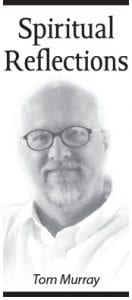He asked them, “But who do you say that I am?” Peter answered him, “You are the Messiah.” Mark 8: 29
I often wonder about how Jesus’ disciples remembered him in the three days following his death. Before the resurrection, as they gathered in shock and grief to mourn their friend, how did they want to remember him? Perhaps they wanted to remember his teaching before large crowds of people, those moments when he healed others, when he calmed the Sea of Galilee, or when he fed vast crowds of people. Maybe, for some, he was defined by the private moments he spent with them alone and apart from the craziness that surrounded them.
The part of Jesus’ life that I’m almost certain none of them wanted to remember was his crucifixion. Crucifixion was a brutal reminder of what happens when you cross the line and threaten the social order. The crucifixion of Jesus had to have hung over those disciples like a pall, suffocating them and turning their world on its head.
And yet, hanging on a cross is exactly where we see Jesus best. It is at the cross that Jesus’ life is once and for all defined for us. We are called to follow him all the way to the grave so that we might live with him. We are buried with him, through our baptism into death, so that we might live a new life with God.
This is the inverted logic of God’s kingdom. When Peter proclaims that Jesus is the Messiah, he gets the title right, but he gets the meaning of it all wrong. He can’t see that not only will Jesus’ identity include his eventual death and resurrection, Jesus will one day be defined by them.
He can’t imagine that one day people will look back through the lens of the resurrection and recognize that it is through Jesus’ suffering and death that they see him most clearly.
Peter can’t yet see that the life that Jesus calls us to is the very opposite of how this world invites us to live. The logic of this world tells us that the only way to find security is by gaining influence over others. The logic of this world tells us that we can only be content if we invest ourselves in accumulating the things that this world creates. We don’t have to look very far to see this at work. It’s the premise of every marketing campaign ever thought up. It’s the basis of our political rhetoric. It drives the decisions we make every day.
And yet, against all of this, Jesus comes urging us to give of ourselves and to put others first. Jesus calls on us to take up the burdens of those who are oppressed, poor, lonely, or unable to care for themselves.
He sums it all up by proclaiming, “If you want to follow me, you have to deny yourself and take up your cross first.”
No wonder Jesus is not only disbelieved, but also ridiculed and rejected. The Messiah is supposed to be powerful, because we crave power. We loathe any suggestion that we might be weak. But Jesus proclaims that if we want to live as his disciples, we have to turn away from power and be the exact opposite of what this world demands of us.
Jesus proclaims that in order to live with him we need to be last, not first. And to make sure that we understand what he’s saying, he lifts up the most vulnerable among us as examples of who will inherit eternal life … children, the outcast, the diseased, and the despised.
We respond to this calling with joy because deep inside we can see that all of the things of this world eventually lead to emptiness and sorrow. Our power, possessions and pleasures all turn to dust when our journey through this life ends. The true life that Jesus offers us is a life centered on the cross and the empty tomb. It is a life that is permanent. It is a life that is freely given. It is a life that is open to all.
Each month a member of the Cook County Ministerium will offer Spiritual Reflections. This month’s s contributor is Tom Murray of the Lutsen and Zion Lutheran churches.



Loading Comments